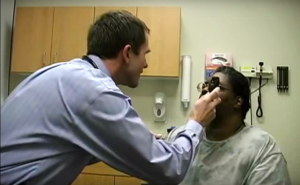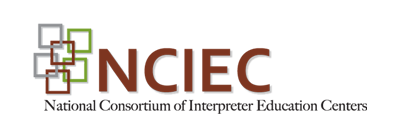Exploring Healthcare Interpreting
To Your Future Health
An infusion module for Interpreter Education Programs
Exploring Healthcare Interpreting
The following resources are designed to help you explore what is required to interpret in healthcare settings. This includes looking at both ethical decision-making as well as the knowledge and skills used.
Comparing and Contrasting Ethical Frameworks
Objective: Compare and contrast how ethical decision-making frameworks are applied in healthcare and other settings.
Ethics in Healthcare
Objective: Compare and contrast how ethical decision-making frameworks are applied in healthcare and other settings.
This activity is designed for courses that explore ethical decision-making and for students to think about how interpreters approach their work in a healthcare setting.
Assignment:
Review the following Articles
- RID/NAD Code of Professional Conduct, (rid.org/ethics/code-of-professional-conduct/)
- NCIHC Code of Ethics
(www.ncihc.org/assets/documents/publications/NCIHC%20National%20Code%20of%20Ethics.pdf) - NCIHC Standards of Practice.
(http://www.ncihc.org/assets/documents/publications/NCIHC%20National%20Standards%20of%20Practice.pdf)
Evaluation:
Use the following questions for reflection:
- What underlying values are consistent throughout all of the documents?
- What differences exist between the RID/NAD CPC and the documents from the NCIHC?
- In your opinion, are the differences due to the focus on healthcare or because the NCIHC focuses on spoken and signed languages?
- How do you think the overall ethical framework of the medical profession, particularly the concept of “Do No Harm,” affects ethical frameworks for interpreters in healthcare settings?
Check with your instructor as to whether you should write a short paper answer these questions or come prepared for a classroom discussion.
Sample of Body Language Workshops
Objectives:
- Accurately describe anatomical and physiological conditions related to the cardiovascular system in American Sign Language
- Identify resources for building knowledge related to anatomy, physiology, and medical conditions and procedures.
 This is an excerpt of an online module created and sponsored by the CATIE Center at St. Catherine University. The Body Language module allows participants to learn about anatomy and physiology as well as clinical conditions in both English and ASL. It draws on the ASL examples from Nigel Howard, a Certified Deaf Interpreter and educator who is renowned for his ability to describe medical concepts in ASL. Additionally, there are examples from Doug Bowen-Bailey, an interpreter and educator with extensive experience in healthcare settings. The sample includes activities from 5 modules:
This is an excerpt of an online module created and sponsored by the CATIE Center at St. Catherine University. The Body Language module allows participants to learn about anatomy and physiology as well as clinical conditions in both English and ASL. It draws on the ASL examples from Nigel Howard, a Certified Deaf Interpreter and educator who is renowned for his ability to describe medical concepts in ASL. Additionally, there are examples from Doug Bowen-Bailey, an interpreter and educator with extensive experience in healthcare settings. The sample includes activities from 5 modules:
- A Cardio Workout (Cardiovascular system)
- No More Digestive Distress (Digestive System)
- All in the Lungs (Respiratory System)
- Put some Meat on your Bones (Muscular-Skeletal System)
- Dealing with Diabetes
Click here to view the sample.
URL: http://www.healthcareinterpreting.org/online/course/view.php?id=13
Sample of “Interpreting Healthcare Discourse”
Objective: To develop understanding of perspectives of patients and providers in healthcare settings
 This is an excerpt of an online module created and sponsored by the CATIE Center at St. Catherine University. The Interpreting Healthcare Discourse module seeks to be an entry point to thinking about the unique qualities of interpreting in healthcare settings. We start focusing on a fundamental interaction between patients and the American healthcare system: the History and Physical Interview (H & P). This H & P generally happens with a primary physician – and is done in similar ways by physicians across systems and locales. This entry point provides an opportunity for thinking about what special requirements exist for working in healthcare settings.
This is an excerpt of an online module created and sponsored by the CATIE Center at St. Catherine University. The Interpreting Healthcare Discourse module seeks to be an entry point to thinking about the unique qualities of interpreting in healthcare settings. We start focusing on a fundamental interaction between patients and the American healthcare system: the History and Physical Interview (H & P). This H & P generally happens with a primary physician – and is done in similar ways by physicians across systems and locales. This entry point provides an opportunity for thinking about what special requirements exist for working in healthcare settings.
Click here to view the sample.
URL: http://www.healthcareinterpreting.org/online/course/view.php?id=20
Copyright © 2013-2016 by the National Consortium of Interpreter Education Centers (NCIEC).
This NCIEC product was developed by the National Interpreter Education Center (NIEC) at Northeastern University. Permission is granted to copy and disseminate these materials, in whole or in part, for educational, non-commercial purposes, provided that NCIEC is credited as the source and referenced appropriately on any such copies.
Student Resources
This resource is intended to be included in your institution’s learning management system. Please return to your school’s web site for any activities.

